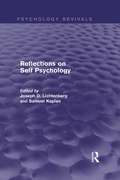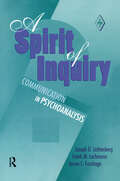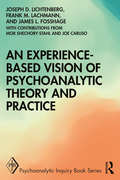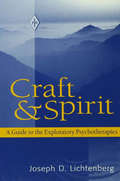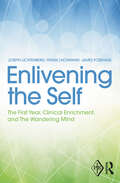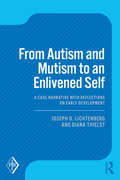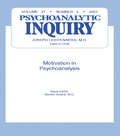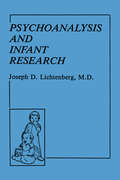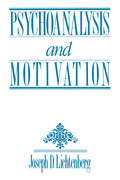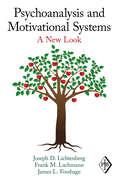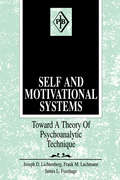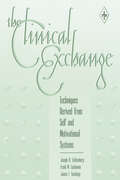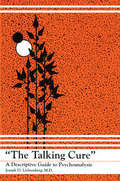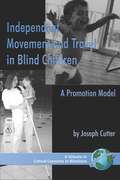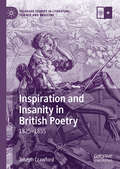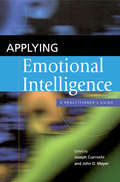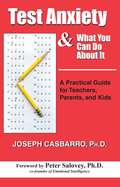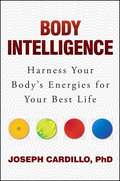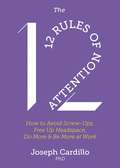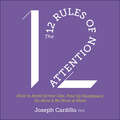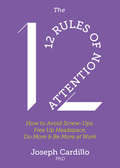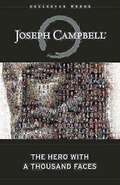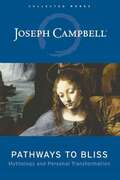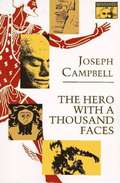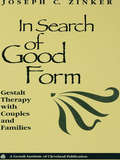- Table View
- List View
Reflections on Self Psychology (Psychology Revivals)
by Joseph D. Lichtenberg and Samuel KaplanOriginally published in 1983, Reflections on Self Psychology records the development of a powerful initiative to alter psychoanalytic theory and practice, and an evaluative questioning of this initiative. It presents a dialogue that developed at the Boston Symposium of 1980 between vigorous proponents of self psychology, equally energetic critics, and many participants between these polar positions. This book attempts to capture within its pages not only the content of what was presented, explored, and evaluated in Boston, but also a sense of the people, about 1,000 strong, who exchanged their ideas on and off the podium – and the remarkable spirit of open inquiry that invigorated these proceedings. The book, as was the meeting, is organized to explore four subjects: the development of the self: infant research; the implications of self psychology for psychoanalytic practice; self psychology and psychotherapy; and the implications of self psychology for psychoanalytic theory. The final section of the book is devoted to an essay by Heinz Kohut that provides an integrated response to the issues and criticisms raised in the course of the symposium. This essay while based on extemporaneous responses by Kohut during different phases of the meeting, is, in its written version, a cohesive, carefully revised, and edited statement prepared in the mellowing period following the meeting and before Kohut’s untimely death.
A Spirit of Inquiry: Communication in Psychoanalysis (Psychoanalytic Inquiry Book Series #19)
by Joseph D. Lichtenberg Frank M. Lachmann James L. FosshageThoroughly grounded in contemporary developmental research, A Spirit of Inquiry: Communication in Psychoanalysis explores the ecological niche of the infant-caregiver dyad and examines the evolutionary leap that permits communication to take place concurrently in verbal an nonverbal modes. Via the uniquely human capacity for speech, the authors hold, intercommunication deepens into a continuous process of listening to, sensing into, and deciphering motivation-driven messages. The analytic exchange is unique owing to a broad communicative repertoire that encompasses all the permutations of day-to-day exchanges. It is the spirit of inquiry that endows such communicative moments with an overarching sense of purpose and thereby permits analysis to become an intimate relationship decisively unlike any other. In elucidating the special character of this relationship, the authors refine their understanding of motivational systems theory by showing how exploration, previously conceptualized as a discrete motivational system, simultaneously infuses all the motivational systems with an integrative dynamic that tends to a cohesive sense of self. Of equal note is their discerning use of contemporary attachment reseach, which provides convincing evidence of the link between crucial relationships and communication. Replete with detailed case studies that illustrate both the context and nature of specific analytic inquiries, A Spirit of Inquiry presents a novel perspective, sustained by empirical research, for integrating the various communicative modalities that arise in any psychoanalytic treatment. The result is a deepened understanding of subjectivity and intersubjectivity in analytic relationships. Indeed, the book is a compelling brief for the claim that subjectivity and intersubjectivity, in their full complexity, can only be understood through clinically relevant and scientifically credible theories of motivation and communication.
An Experience-based Vision of Psychoanalytic Theory and Practice: Seeking, Feeling, and Relating (Psychoanalytic Inquiry Book Series)
by Joseph D. Lichtenberg Frank M. Lachmann James L FosshageAn Experience-based Vision of Psychoanalytic Theory and Practice looks at each individual as a motivated doer doing, seeking, feeling, and intending, and relates development, sense of self, and identity to changes that are brought about in analytic psychotherapy. Based on conceptualizing experience as it is lived from infancy throughout life, this book identifies three major pathways to development and applies Lichtenberg, Lachmann, and Fosshage’s experience-based vision to psychoanalytic psychotherapy. Using detailed clinical narratives and vignettes, as well as organizational studies, the book takes up the distinction between a person’s responding to a failure in achieving a goal with disappointment and seeking an alternative path, or with disillusion and a collapse in motivation. From the variety of topics covered, the reader will get a broad overview of an experience-based analytic conception of motivation begun with Lichtenberg’s seven motivational systems. This title will be of great interest to established psychoanalysts, as well as those training in psychoanalysis and clinical counselling psychology programs.
Craft and Spirit: A Guide to the Exploratory Psychotherapies (Psychoanalytic Inquiry Book Series #20)
by Joseph D. LichtenbergIn Craft and Spirit, Joseph Lichtenberg writes of the craft of exploratory psychotherapy, by which he means the creative skill — even artistry — that mobilizes the spirit of inquiry in therapist and patient and sustains it over the course of psychotherapy. He expatiates on this craft as it pertains to patients of our time — patients who typically bring to therapy backgrounds of insecure attachment and serious concerns about safety and retraumatization. In each of ten chapters, Lichtenberg formulates a different guideline for technique, keyed to the broad domain of exploratory psychotherapies and are accompanied by numerous clinical illustrations. These guidelines seek to foster greater therapist involvement without compromising an openness to psychological exploration. They seek to sensitize therapists to the two interlacing tracks of communication that unfold in treatment: those of verbal exchange and of enactive messages. And they help guide therapist attention among interpenetrating domains of the patient’s subjectivity, the therapist’s subjectivity, and the intersubjective realm that emerges from their collaborative experience. Fusing the humanist tradition of therapeutic inquiry with knowledge gained from recent infancy and child research, Lichtenberg develops guidelines suitable to exploratory therapy with patients who communicate not only verbally but also through diverse affect states and altered cognitions. Consistently illuminating on the parallels and disjunctions between caregiver–child and therapist–patient relationships, Lichtenberg is clear about the adult-to-adult dimension of exploratory work in which “provision” is necessarily subordinate to “inquiry.” Craft and Spirit is aimed equally at prospective patients, therapists, and analysts, all of whom will be edified by this masterful demonstration of the ways in which a spirit of inquiry imbues the craft of psychotherapy, in Lichtenberg’s words, “with its liveliness of sustained purpose.”
Enlivening the Self: The First Year, Clinical Enrichment, and The Wandering Mind (Psychoanalytic Inquiry Book Series)
by Joseph D. Lichtenberg Frank M. Lachmann James L. FosshageIn psychoanalysis, enlivenment is seen as residing in a sense of self, and this sense of self is drawn from and shaped by lived experience. Enlivening the Self: The First Year, Clinical Enrichment, and the Wandering Mind describes the vitalizing and enrichment of self-experience throughout the life cycle and shows how active experience draws on many fundamental functional capacities, and these capacities come together in support of systems of motivation; that is, organized dynamic grouping of affects, intentions, and goals. The book is divided into three essays: Infancy – Joseph Lichtenberg presents extensive reviews of observation and research on the first year of life. Based on these reviews, he delineates twelve foundational qualities and capacities of the self as a doer doing, initiating and responding, activating and taking in. Exploratory therapy – James L. Fosshage looks where therapeutic change is entwined with development. There are many sources illustrated for enhancing the sense of self, and Frank M. Lachmann pays particular attention to humor and to the role that the twelve qualities and capacities play in the therapeutic process. The wandering mind – Frank M. Lachmann covers the neuroscience and observation that "mind wandering" is related to the immediacy of the sense of self linking now with past and future. Throughout the book the authors’ arguments are illustrated with rich clinical vignettes and suggestions for clinical practice. This title will be a must for psychoanalysts, including trainees in psychoanalysis, psychiatry residents and candidates at psychoanalytic institutes and also graduate students in clinical and counselling psychology programs.
From Autism and Mutism to an Enlivened Self: A Case Narrative with Reflections on Early Development (Psychoanalytic Inquiry Book Series)
by Joseph D. Lichtenberg Diana ThielstFrom Autism and Mutism to an Enlivened Self explores the importance of intimacy, interaction with the environment and the mind-body connection in early childhood development, with specific reference to autism. Built around a detailed case study of a severely autistic child, the book offers an illuminating account of the development and successful treatment of autism both from the perspective of the clinician and from the family. In Part I, Diana Thielst (writing under a pseudonym) gives a description of her experience with her daughter who was autistic at birth, minimally verbal at age five, and did not respond to her name. She details the severe family stress and her ineffectual attempts to get professional help. Finally, she hears of consultants who may be able to help in St. Petersburg, Russia. Guided by the consultants, Thielst and her daughter then embark on a uniquely innovative method for Anna to both build a vocabulary and for the first time learn the value of coordinated and cooperative effort. Armed with a vocabulary and a long history of solo pursuits of organizing inanimate objects, Anna suddenly begins to explore "human" interaction as revealed in comics– a turning on to an emotional life of relatedness and intimacy. In Part II, Joseph D. Lichtenberg uses his knowledge of neonate and early infancy to offer the reader an understanding of autism – its history – and a unique comparison of the normal well adapted neonate and infant at one year with the disrupted development of the child with autism. Lichtenberg’s theoretical construct of three major pathways to a healthy adapted development breaks new theoretical ground and gives enrichment to a contemporary portrayal of the autistic experience. With unusually rich clinical material grounded in accessible theory, the authors jointly offer a new perspective on understanding, treating and living with autism. From Autism and Mutism to an Enlivened Self will appeal to psychoanalysts, psychoanalytic psychotherapists and clinicians working with autistic children.
Motivation and Psychoanalysis: Psychoanalytic Inquiry, 21.5 (Psychoanalytic Inquiry Book Ser.)
by Joseph D. LichtenbergFirst published in 2002. Routledge is an imprint of Taylor & Francis, an informa company.
Psychoanalysis and Infant Research (Psychoanalytic Inquiry Book Series #2)
by Joseph D. LichtenbergLichtenberg collates and summarizes recent findings about the first two years of life in order to examine their implications for contemporary psychoanalysis. He explores the implications of these data for the unfolding sense of self, and then draws on these data to reconceptualize the analytic situation and to formulate an experiential account of the therapeutic action of analysis.
Psychoanalysis and Motivation (Psychoanalytic Inquiry Book Series)
by Joseph D. LichtenbergCarrying forward his inquiry into the nature and conditions of normal and abnormal development, Lichtenberg focuses on motivation. His goal is to offer an alternative to psychoanalytic drive theory that accommodates the developmental insights of infancy research while accounting for the entire range of phenomena addressed by the theory of instinctual drives. To this end, he propounds a comprehensive theory of the self, which then gains expression in five discrete yet interactive motivational systems.
Psychoanalysis and Motivational Systems: A New Look (Psychoanalytic Inquiry Book Series)
by Joseph D. Lichtenberg Frank M. Lachmann James L. FosshageIntroduced in Psychoanalysis and Motivation (1989) and further developed in Self and Motivational Systems (1992), The Clinical Exchange (1996), and A Spirit of Inquiry (2002), motivational systems theory aims to identify the components and organization of mental states and the process by which affects, intentions, and goals unfold. Motivation is described as a complex intersubjective process that is cocreated in the developing individual embedded in a matrix of relationships with others. Opening by placing motivational systems theory within a contemporary dynamic systems theory, Lichtenberg, Lachmann, and Fosshage then respond to critics of motivational systems theory. The authors present revisions to their approach to the original five motivational systems, adding two more: an affiliative and a caregiving motivational system. The authors go on to suggest, using ideas garnered from complexity theory and fractals, that motivational systems theory can help us understand how a continuity of self can be maintained despite near-constant fluctuations in interpersonal relations. They then consider how the making of inferences, explicitly and implicitly, is shaped by motivation, before applying their theory to an actual human experience - love - to demonstrate the interplay of multiple shifting motivations within an individual. Last, they present new looks at the clinical applicability of their research. Grounded in observational research of infants but relevant to psychoanalysis at any stage of life, motivational systems theory has evolved via the combined experiences of these three analysts for more than 20 years, and remains an important contribution to our understanding of the driving forces behind human experience.
Self and Motivational Systems: Towards A Theory of Psychoanalytic Technique (Psychoanalytic Inquiry Book Series #13)
by Joseph D. Lichtenberg Frank M. Lachmann James L. FosshageIn this sequel to Lichtenberg's Psychoanalysis and Motivation (TAP, 1989), the authors show how their revised theory of motivation provides the foundation for a new approach to psychoanalytic technique. The approach in Self and Motivational Systemsemphasizes a finely honed sensitivity to moment-to-moment analytic exchanges and an appreciation of which motivational system is dominant during that exchange. Throughout, the authors stress the creative power of psychoanalysis as a joint effort shaped by the intersubjective context of a particular analysand communicating and interacting with a particular analyst. At the heart of the analytic relationship is the analysand's expectation of evoking a vitalizing selfobject experience from the analyst and the analyst's expectation, in turn, of evoking a selfobject experience of efficacy from his or her work with the analysand.
The Clinical Exchange: Techniques Derived from Self and Motivational Systems (Psychoanalytic Inquiry Book Series #16)
by Joseph D. Lichtenberg Frank M. Lachmann James L. FosshageIn this practical sequel to the same authors' Self and Motivational Systems (TAP, 1992), Lichtenberg, Lachmann, and Fosshage offer ten principles of technique to guide the clinical exchange. These principles, which pertain equally to exploratory psychotherapy and psychoanalysis, integrate the findings of self psychology with recent developmental research that has refined our understanding of the self as a center of experience and motivation. The ten principles of technique not only provide a valuable framework for attending to a wide range of motivations, but lead to basic revisions in the theory and technical management of affects, transference, and dreams.
The Talking Cure: A Descriptive Guide to Psychoanalysis
by Joseph D. LichtenbergAmong the many elementary expositions of psychoanalysis, "The Talking Cure" is unique in focusing on the actual analytic experience. Lichtenberg's approach is humanistic, demonstrating empathic understanding of the fears and hopes of the person seeking help. He provides a "feel" for what happens during the analytic voyage of self-discovery.
Independent Movement and Travel in Blind Children: A Promotion Model
by Joseph CutterAn innovative guide to encouraging activity, movement, and independence in the young blind child and full of creative ideas, this book provides guidance for parents, teachers, instructional assistants, physical therapists, teachers of the blind, and O&M instructors who desire to create a learning environment in which the blind child can become curious, involved, active and independent.
Inspiration and Insanity in British Poetry: 1825–1855 (Palgrave Studies in Literature, Science and Medicine)
by Joseph CrawfordThis book explores the ways in which poetic inspiration came to be associated with madness in early nineteenth-century Britain. By examining the works of poets such as Barrett, Browning, Clare, Tennyson, Townshend, and the Spasmodics in relation to the burgeoning asylum system and shifting medical discourses of the period, it investigates the ways in which Britain’s post-Romantic poets understood their own poetic vocations within a cultural context that insistently linked poetic talent with illness and insanity. Joseph Crawford examines the popularity of mesmerism among the writers of the era, as an alternative system of medicine that provided a more sympathetic account of the nature of poetic genius, and investigates the persistent tension, found throughout the literary and medical writings of the period, between the Romantic ideal of the poet as a transcendent visionary genius and the ‘medico-psychological’ conception of poets as mere case studies in abnormal neurological development.
Applying Emotional Intelligence: A Practitioner's Guide
by John D. Mayer Joseph CiarrochiThe explosion of research on emotional intelligence (EI) in the past decade has provided increasing evidence that EI can be measured reliably and can be useful in predicting important outcomes, such as managerial effectiveness and relationship quality. Naturally, people are now asking, "So, how does one improve EI?". Applying Emotional Intelligence collects the most important programs focused on that idea, and enquires of their originators, "What do you do?", "Why do you do it?", and, "What is the evidence for your approach?". The emphasis of the book is applied, in that it provides and contrasts concrete examples of what we do in our interventions in a wide variety of situations. The chapters present descriptions of programs, including specific activities and exercises that influence emotional knowledge and social effectiveness more generally. While practical in its focus, this book also discusses the theoretical bases for these approaches. These are new programs with outcomes that are now beginning to be studied. The book presents the most important and recent research findings that examine the efficacy of these programs. Applying Emotional Intelligence is a "must-read" for anyone interested in EI and its application. This book will be of interest to researchers conducting EI intervention research, as well as a wide variety of practitioners, including those interested in developing EI in organizations, health areas, clinical populations, and school-age settings. Finally, the book is designed to be relevant to the reader's own life, encouraging the reader to consider how the programs and the exercises might impact his or her personality and outlook, as well as contribute to the development of those who have themselves participated in the programs.
Test Anxiety and What You Can Do About It: A Practical Guide for Teachers, Parents, and Kids
by Joseph CasbarroHigher standards and greater accountability have contributed to an alarming rise in test anxiety in our students. To help them pass mandated assessments, teachers drill on facts and give endless practice tests. But teaching to the test isn't enough. High stakes testing produces high anxiety that, in turn, lowers performance. Teachers, parents, and kids must do more to minimize its negative effects and increase test results. But where do we begin? Test Anxiety & What You Can Do About It offers constructive and powerful strategies that specifically target the physical, emotional, and cognitive symptoms of anxiety. This book serves as a comprehensive and practical guide for test- takers of all ages. It is an essential resource for teachers and parents of students who are faced with the increased testing mandates of the No Child Left Behind Act Take control! Increase understanding, enhance recall, regulate emotions, and improve test performance through the reduction of test anxiety. This book is the right resource at the right time!
Body Intelligence
by Joseph CardilloFrom the holistic psychology expert and author of the mind-body-spirit classic Be Like Water, comes a guide filled with revolutionary methods to help you find the physical and psychological energy you need to live a vibrant life.Have you ever told yourself to power through, "fake it until you make it," put mind over matter--and found yourself hitting a wall, day after day after day? We're all familiar with this "positive thinking" approach for managing our lives and getting through rough times. Ironically, these methods often fail us because we end up wearing ourselves down by the effort it takes to constantly maintain such an upbeat outlook. So what if instead of working to fix our mindset for better energy, we synced our body's energy to create a better mind? In Body Intelligence, Joseph Cardillo, PhD, combines Western science, technology, psychology, and holistic medicine to show that we must first balance the body's energies before we can enhance the mind. Based on cutting-edge ideas, this perennial guide teaches us to tap into our energetic "sweet spot" and identify specific steps we must take to remove energy blocks. Packed with exercises, self-tests, and step-by-step instructions, Body Intelligence provides all the interactive tools for beginners and experienced energy-balancing practitioners alike to improve and understand the specific energy needed to live a happy, healthy, fulfilling life. So open the door to a vivacious, vivid life and start living the matter-over-mind way--your best way!
The 12 Rules of Attention: How to Avoid Screw-Ups, Free Up Headspace, Do More & Be More At Work
by Joseph CardilloHow to self-regulate and train your brain's attentional mechanism for faster, more accurate, high-quality performance at work.Do you feel like you're "crushing it?" How productive, happy and fulfilled do you feel each day at your job?You might ask what attention has to do with it. The answer may help fix a wide range of ongoing workplace concerns, including workplace error.Simply put, attention is connected to every single thing you think, feel and do at work. It's almost impossible to imagine, but by the end of this book you'll understand how that is, and you'll be tapping into your attentional system and regulating it to your highest advantage.You'll learn how to:* Use your entire attentional system, beyond just focus* Avoid fading out * Relieve data overflow, internal and external distraction * Use "at a glance" mental capacity to "catch" more desired detail * Regulate the brain's automatic, high-speed attention triggers and use them to your advantage* Turn your cell phone into a focus-enhancing device.The 12-Rules of Attention shows you how to train your attention to sharp, accurate, high definition... and keep it there.
The 12 Rules of Attention: How to Avoid Screw-Ups, Free Up Headspace, Do More & Be More At Work
by Joseph CardilloHow to self-regulate and train your brain's attentional mechanism for faster, more accurate, high-quality performance at work.Do you feel like you're "crushing it?" How productive, happy and fulfilled do you feel each day at your job?You might ask what attention has to do with it. The answer may help fix a wide range of ongoing workplace concerns, including workplace error.Simply put, attention is connected to every single thing you think, feel and do at work. It's almost impossible to imagine, but by the end of this book you'll understand how that is, and you'll be tapping into your attentional system and regulating it to your highest advantage.You'll learn how to:* Use your entire attentional system, beyond just focus* Avoid fading out * Relieve data overflow, internal and external distraction * Use "at a glance" mental capacity to "catch" more desired detail * Regulate the brain's automatic, high-speed attention triggers and use them to your advantage* Turn your cell phone into a focus-enhancing device.The 12-Rules of Attention shows you how to train your attention to sharp, accurate, high definition... and keep it there.(P)2020 Hodder & Stoughton Limited
The 12 Rules of Attention: How to Avoid Screw-Ups, Free Up Headspace, Do More and Be More At Work
by Joseph CardilloDo you feel like you're "crushing it?" How productive, happy and fulfilled do you feel each day at your job? You might ask what attention has to do with it. The answer may help clear up and fix a wide range of ongoing workplace concerns including workplace error. Simply put, attention is connected to every single thing you think, feel and do at work and elsewhere. It's almost impossible to imagine, but by the end of this book you'll not only understand how this is so, but you will be tapping into your attentional system and regulating it to your highest advantage. The 12-Rules of Attention will help you train your attention to sharp, accurate, high definition...and keep it there. You'll learn: How to use the entire attentional system, beyond just focus (which is only one part) How to avoid fading out Awareness, mindfulness and attention are not the same thing and how and when to employ each A process to relieve data overflow, internal and external distraction How to use "in a glance" mental capacity to "catch" more desired detail How to regulate the brain's automatic, high-speed attention triggers and use them to your advantage
Hero With A Thousand Faces (The\collected Works Of Joseph Campbell Ser.)
by Joseph CampbellSince its release in 1949,The Hero with a Thousand Faces has influenced millions of readers by combining the insights of modern psychology with Joseph Campbell’s revolutionary understanding of comparative mythology. In these pages, Campbell outlines the Hero’s Journey, a universal motif of adventure and transformation that runs through virtually all of the world’s mythic traditions. He also explores the Cosmogonic Cycle, the mythic pattern of world creation and destruction. As part of the Joseph Campbell Foundation’s Collected Works of Joseph Campbell, this third edition features expanded illustrations, a comprehensive bibliography, and more accessible sidebars. As relevant today as when it was first published,The Hero with a Thousand Faces continues to find new audiences in fields ranging from religion and anthropology to literature and film studies. The book has also profoundly influenced creative artists including authors, songwriters, game designers, and filmmakers and continues to inspire all those interested in the inherent human need to tell stories.
Pathways to Bliss: Mythology and Personal Transformation (The Collected Works of Joseph Campbell.)
by Joseph CampbellJoseph Campbell famously defined myth as “other people's religion.” But he also said that one of the basic functions of myth is to help each individual through the journey of life, providing a sort of travel guide or map to reach fulfillment — or, as he called it, bliss. For Campbell, many of the world's most powerful myths support the individual's heroic path toward bliss. <p><p> In Pathways to Bliss, Campbell examines this personal, psychological side of myth. Like his classic best-selling books Myths to Live By and The Power of Myth, Pathways to Bliss draws from Campbell's popular lectures and dialogues, which highlight his remarkable storytelling and ability to apply the larger themes of world mythology to personal growth and the quest for transformation. Here he anchors mythology's symbolic wisdom to the individual, applying the most poetic mythical metaphors to the challenges of our daily lives. <p><p> Campbell dwells on life's important questions. Combining cross-cultural stories with the teachings of modern psychology, he examines the ways in which our myths shape and enrich our lives and shows how myth can help each of us truly identify and follow our bliss.
The Hero With a Thousand Faces
by Joseph CampbellThe first popular work to combine the spiritual and psychological insights of modern psychoanalysis with the archetypes of world mythology, the book creates a roadmap for navigating the frustrating path of contemporary life.
In Search of Good Form: Gestalt Therapy with Couples and Families
by Joseph C. ZinkerWith In Search of Good Form, Joseph Zinker emphasizes seeing and being with as keys to a phenomenological approach in which therapist and patient co-create and mutually articulate their own experiences and meanings. He considers Gestalt field theory, the Gestalt interactive cycle, and Gestalt concepts.
